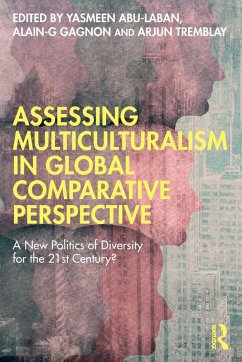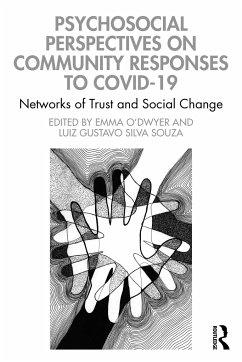
Fighting Discrimination in a Hostile Political Environment
The Case of "Colour-Blind" France
Herausgegeben: Escafré-Dublet, Angéline; Guiraudon, Virginie; Talpin, Julien
Versandkostenfrei!
Versandfertig in 6-10 Tagen
154,99 €
inkl. MwSt.

PAYBACK Punkte
77 °P sammeln!
The book investigates the experience of ethno-racial discrimination in France and the forms that resistance takes in a colour-blind context.Among pluriethnic, multi-religious, post-colonial states with a long immigration history, France holds a specific place in international comparisons due to its distinct colour-blindness. It does not recognize racial or ethnic groups either as legitimate social or political categories or as targets for policy. Nevertheless, the book embarks in testing existing theories on the experience of discrimination, and on the diverse repertoire of collective action t...
The book investigates the experience of ethno-racial discrimination in France and the forms that resistance takes in a colour-blind context.
Among pluriethnic, multi-religious, post-colonial states with a long immigration history, France holds a specific place in international comparisons due to its distinct colour-blindness. It does not recognize racial or ethnic groups either as legitimate social or political categories or as targets for policy. Nevertheless, the book embarks in testing existing theories on the experience of discrimination, and on the diverse repertoire of collective action to fight discriminatory practices in France. It features chapters that draw on empirical qualitative research done at various levels of political action (city, regional or national) and focusing on various actors (inhabitants, activists, administrative, judicial and elected officials). The contributors argue that far from disappearing, race operates at the political level and is embedded in policy design. They highlight the centrality of institutions and policies in the production of a colour-blind racial regime. Despite the hostile character of the French political environment, the fight against discrimination takes renewed forms, from infrapolitical tactics to legal battles. While the social sciences have, themselves, been under attack, scholarship on France demonstrates the reproduction of ethnoracial inequalities and investigates the forms that resistance to discrimination takes.
Fighting Discrimination in a Hostile Political Environment will be a key resource for academics, researchers, and advanced students of Race and Ethnic Studies, Politics and Public Policy, European Studies, Research Methods and Sociology. This book was originally published as a special issue of Ethnic and Racial Studies.
Among pluriethnic, multi-religious, post-colonial states with a long immigration history, France holds a specific place in international comparisons due to its distinct colour-blindness. It does not recognize racial or ethnic groups either as legitimate social or political categories or as targets for policy. Nevertheless, the book embarks in testing existing theories on the experience of discrimination, and on the diverse repertoire of collective action to fight discriminatory practices in France. It features chapters that draw on empirical qualitative research done at various levels of political action (city, regional or national) and focusing on various actors (inhabitants, activists, administrative, judicial and elected officials). The contributors argue that far from disappearing, race operates at the political level and is embedded in policy design. They highlight the centrality of institutions and policies in the production of a colour-blind racial regime. Despite the hostile character of the French political environment, the fight against discrimination takes renewed forms, from infrapolitical tactics to legal battles. While the social sciences have, themselves, been under attack, scholarship on France demonstrates the reproduction of ethnoracial inequalities and investigates the forms that resistance to discrimination takes.
Fighting Discrimination in a Hostile Political Environment will be a key resource for academics, researchers, and advanced students of Race and Ethnic Studies, Politics and Public Policy, European Studies, Research Methods and Sociology. This book was originally published as a special issue of Ethnic and Racial Studies.














